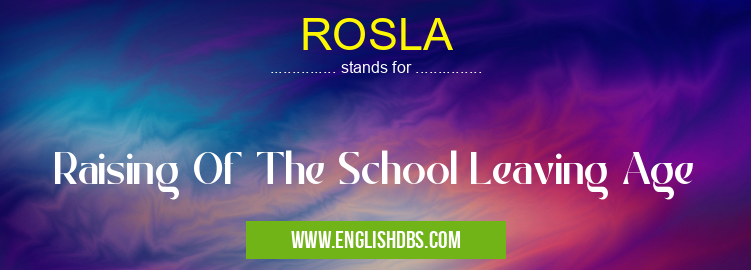What does ROSLA mean in SCHOOLS
Raising of the School Leaving Age (ROSLA) is a policy which requires students to stay in school until they reach a certain age. This policy is implemented in order to ensure that students receive enough education and training so that they can become productive members of society. ROSLA typically requires students to remain enrolled in school until the age of 16 or above, depending on the country. As a result, students are more likely to complete their higher studies and may be better equipped to pursue job opportunities after graduation.

ROSLA meaning in Schools in Community
ROSLA mostly used in an acronym Schools in Category Community that means Raising Of The School Leaving Age
Shorthand: ROSLA,
Full Form: Raising Of The School Leaving Age
For more information of "Raising Of The School Leaving Age", see the section below.
What Is ROSLA?
ROSLA stands for Raising Of The School Leaving Age; it is an educational policy which seeks to raise the minimum school-leaving age from its traditional standard of 15-16 years old, up to 18 years old or beyond. This policy is usually established by both government bodies and schools themselves as a way of promoting further education for young people and enabling them to gain more qualifications over time. Increasing the school-leaving age also allows governments to provide more resources towards secondary education initiatives. Some countries have already implemented this measure, such as England and Wales, who have set their minimum school-leaving age at 18 years old. By doing this, secondary education becomes compulsory until that age, increasing options and opportunities for those who wish to pursue further studies upon graduating from high school. Additionally, having an increased number of citizens with higher levels of qualifications can lead to economic benefits for nations throughout the world.
Benefits Of ROSLA
The potential benefits derived from implementing ROSLA are numerous. Firstly, by requiring students to remain enrolled in educational institutions until they reach a certain age, ROSLA ensures that all citizens have access to quality schooling up until an appropriate level which allows them to pursue higher qualifications if desired. This can benefit not only individuals but also entire countries, since it helps create an educated workforce capable of contributing positively towards economic growth and prosperity. Moreover, raising the school leaving age can help reduce crime rates among young people; since they remain enrolled in educational institutions longer than before then there’s less time available for minors to engage in activities outside of school which might otherwise involve unlawful behaviour such as drug abuse or vandalism. Finally, ROSLA may help reduce poverty rates among adults since fewer people would not be able to enter working life at a very young age and might lack proper qualifications essential for finding employment later on in life.
Essential Questions and Answers on Raising Of The School Leaving Age in "COMMUNITY»SCHOOLS"
How does Raising of the School Leaving age affect the society?
Raising of the school leaving age is beneficial to society as it provides young people with additional opportunities for further education and training, which they can use to gain more employable skills. This can have a positive impact on social mobility and reduce inequality between groups in society. Additionally, raising the school leaving age may also reduce crime rates by providing young people with an engaging alternative to engaging in unlawful behaviour
Final Words:
Overall, Raising Of The School Leaving Age (ROSLA) has many potential benefits both at individual and national level which should be taken into consideration when debating about implementing this policy into law or not. Not only does ROSLA ensure all citizens have access to quality schooling but it also leads towards economic growth and prosperity for nations throughout the world due its positive impact on crime reduction rates among minors as well as poverty levels among adults within populations with high unemployment rates.
